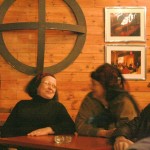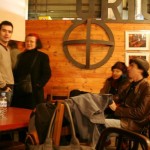Catalán Poetry and Philosophy
Last night our friend Nuria invited us to a poetry reading by a Catalån poet. We had no idea what to expect, but the flyer looked intriguing, saying the poem would be accompanied by 2 Bhagra dancers.
The title of the poem is “Mel”, which means “honey” in Catalån. The poetry performance begins with the poet, handsome, holding a small spotlight on his face. He drools liquid for what feels like a full minute. It seems inconceivable he can drool so much liquid. (We found out later it was meant to represent honey, literally spilling from his mouth). After this he begins reading his poem, which has one line on every page. He reads dramatically, I only understand a few words but this doesn’t matter.
The sound of the words and the language are beautiful and the short passages entrancing.
He pauses after every page and shuts his flashlight/spotlight off. He then turns a floor spotlight on the two female Bhangra dancers who slowly swirl and entwine themselves like a ballet of snakes sliding on and off the stage. At one point one of the dancers throws clouds of dust at the poet as he is reading.
After the last stanza is read the lights go down and uptempo Bhangra music fires up through the speakers. the lights come up and both girls morph into an amazing whirling dervish of elbows, arms and legs at they do a traditional Bhangra dance. The whole thing abruptly stops to thundering applause and we realize that we have been transfixed for the last hour.
This is what poetry *should* do.
The room was packed with Catalån intellectuals, authors, poets, actors, teachers, dancers. People snapping photos and taking videos. Everybody was chain smoking. The place felt authentic, beatnik, hip and I wouldn’t have been surprised if everyone started snapping their fingers after the performance was finished.
Nuria pointed out a philosopher friend of hers across the room. Mark told her (with some help from me) his belief that there should be philosophy stores in every neighborhood. Right next to the panaderia and carniceria there should be a philosophy store where you could go everyday to get a meaningful phrase for a euro, something to get you through the day, or just something to ponder on for a while. They could also sell philosophical phrases on plaques that you could hang on your door.
She seemed to think it was a great idea and took Mark over to introduce him to the philosopher after the performance was over. She said “explice la tienda de filosofia”. (explain your philosophy store to him). Suddenly on the spot, Mark did his bes.t The philosopher understood and liked the idea. He said that at the moment he was working out of a bar and not getting paid very much.




Recent Comments